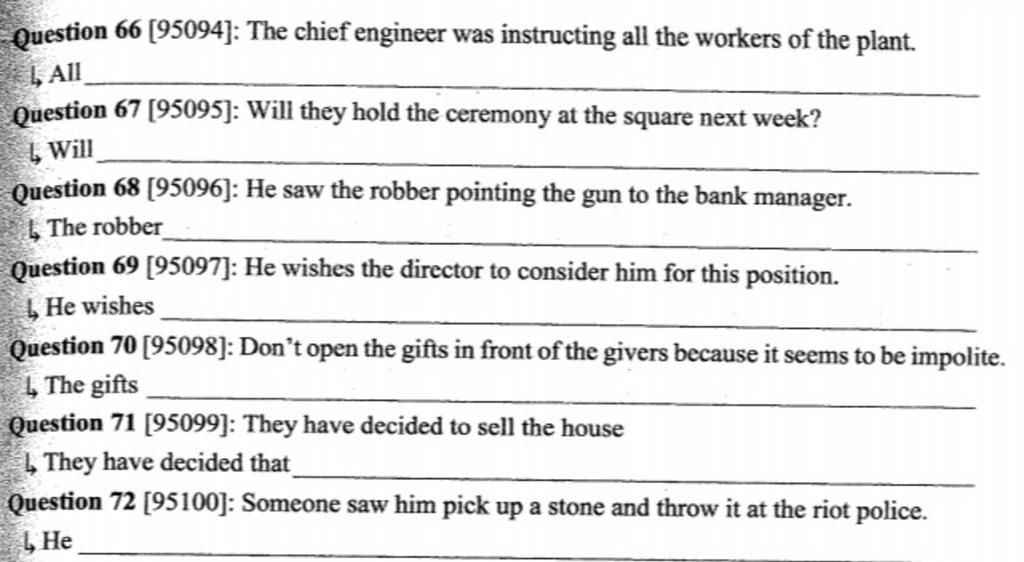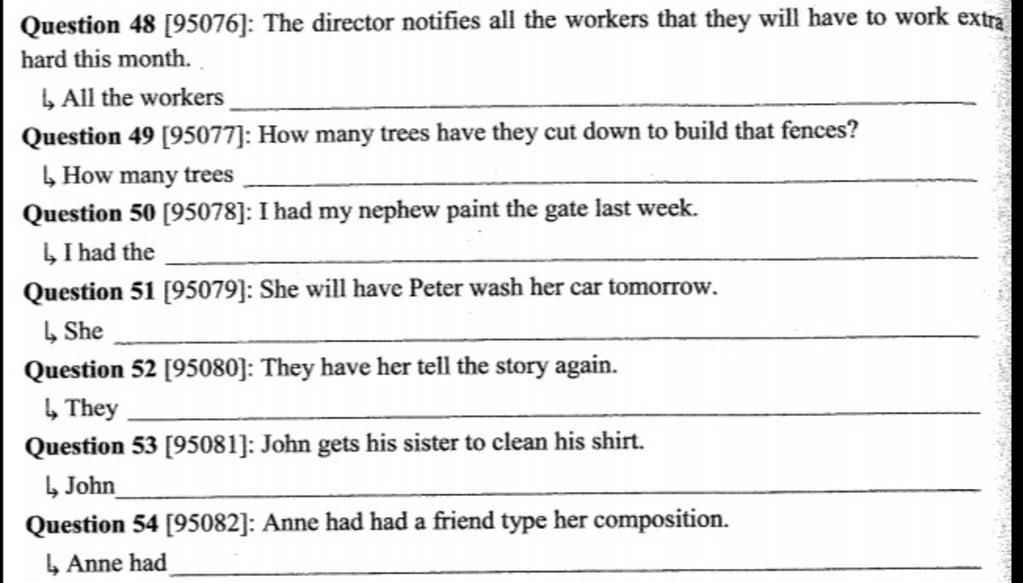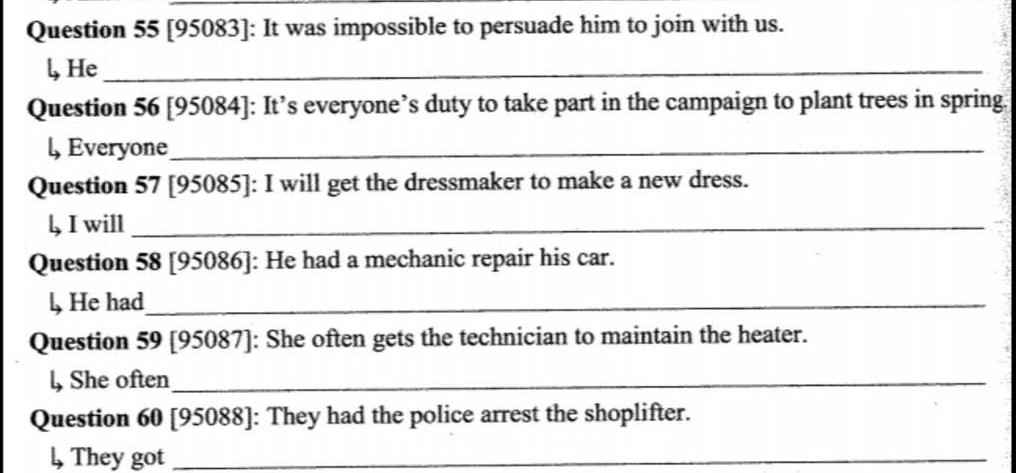
Hãy nhập câu hỏi của bạn vào đây, nếu là tài khoản VIP, bạn sẽ được ưu tiên trả lời.


1 All the worker of the plan were being instructed by the chief engineer
2 Will the ceremony be held at the square next week
3 The robber was seen to point the gun to the bank manager
4 He wishes the director considered him for this position
5 The gifts shouldn't be opened in front of the givers because .....
6 They have decided that the house will be sold
7 He was seen to pick up a stone and throw it....

48 All the workers are notified by the director that they will have to work extra hard this month
49 How many trees have been cut down to build that fences
50 I had the gate painted by my nephew last week
51 She will have her car washed by Peter tomorrow
52 They have the story told again by her
53 John gets his shirt cleaned by his sister
54 Anne had had her composition typed by a friend

55 He was impossible to be persuaded to join with us
56 Everyone has to take part in the campaign to plant trees in spring
57 I will get a new dress made by the dress maker
58 He had his car repaired by a mechanic
59 She often gets the heater maintained by the technician
60 They got the shoplifer arrested by the police

1. I am made to clean the floor.
2. She is allowed to use the mobile phone by her mom.
3. I have my bike repaired by my brother.
4. Mary gets her hair cut by her mother.
5. Kate had an email sent to her manager by me.
6. She had her luggage brought to the hotel room by the sever.
Bài 1: Chuyển các câu sau sang dạng bị động dựa vào những kiến thức đã học ở trên về câu bị động có 2 tân ngữ và câu bị động dạng kép :
1. My mom makes me clean the floor=>i am made to clean the floor by my mom
2. Her mom let her use the mobile phone=>she is allowed to use the mobile phone by her mom
3. I have my brother repair my bike=>i have my bike repaired by my mother
4. Mary gets her mother to cut her hair=>Mary gets her hair cut by her mother
5. Kate had me send an email to her manager=>Kate had an email sent to her manager by me
6. She had the sever bring her luggage to the hotel room=>she had her luggage brought to the hotel room by the sever

1. I don't expect to be invited to his party.
2. We appreciate being warmly welcomed.
3. I can't remember being told about that.
4. Jane admitted being attacked while she was going home last night.
5. Anne hopes to be given some money on her birthday.
6. She doesn't like being called by her nickname.
7. My mother wants these flowers to be watered every day.
8. This building needs to be knocked down to construct a new one.
9. You are sure to be promoted this year.
10. You should avoid being disturbed by little things.

1. These music lessons must be written in ink.
2. Bicycles can be used for short journeys in this city.
3. UFOs have been seen several times by many people recently.
4. We aren't allowed to walk on the glass.
5. This software can be downloaded from the internet.
6. A lot of mountains may be found on Mars.
7. When will you be given a new laptop by your mother?
8. Tuan was sent to a high quality school by his parents last year.
9. A house-warming party is going to be held by Jane this weekend.
10. Are garbage bins put along the streets in your town?
11. A factory is being built to recycle waste paper in this city.
12. Were your mails being checked when the light went out?
13. Some books have been left on that table but they can't be found now.
14. What should be done to stop pollution around their schools?
15. Many trees will be planted around our school to get more shade.
16. A lot of information can be stored in a small USB.
17. Who are your children often looked after by at the weekend?
18. He may be punished for talking in the class by the teacher.
19. Her motorbike has been stolen.
20. This machine couldn't be used without careful instructions.

1) Form of Passive Cấu trúc câu bị động:
Subject + finite form of to be + Past Participle
(Chủ ngữ + dạng của động từ “to be” + Động từ ở dạng phân từ 2) Example: A letter was written.
Khi chuyển câu từ dạng chủ động sang dạng câu bị động:
Tân ngữ của câu chủ động chuyển thành chủ ngữ của câu bị động. Ví dụ: Active: He punished his child. -> Passive: His child was punished. (Anh ta phạt cậu bé.) (Cậu bé bị phạt)
Câu chủ động ở dạng thì nào, chúng ta chia động từ “to be” theo đúng dạng thì đó. Chúng ta vẫn đảm bảo nguyên tắc chủ ngữ số nhiều, động từ “to be” được chia ở dạng số nhiều, chủ ngữ số ít thì động từ “to be” được chia ở dạng số ít.
- Present simple (Hiện tại đơn) The car/cars is/are designed.
- Present perfect (HT hoàn thành) The car/cars has been/have been designed.
- Past simple (Quá khứ đơn) The car/cars was/were designed.
- Past perfect (Qk hoàn thành) The car/cars had been/had been designed.
- Future simple (Tương lai đơn) The car/cars will be/will be designed.
- Future perfect (TL hoàn thành) The car/cars will have been designed
- Present progressive (HT tiếp diễn) The car/cars is being/are being designed.
- Past progressive (Qk tiếp diễn) The car/cars was being/were being designed.
- 2) Wish
Wish ở hiện tại
Để diễn đạt một mong muốn ở hiện tại, chúng ta dùng cấu trúc:
S + wish + thì quá khứ .
Eg : I wish I knew the answer to this question. (at present i don't know the answer)
I wish I didn't have so much work to do . (I do have a lot of work)
2. Wish ở quá khứ
Để diễn đạt một mong muốn ở quá khứ, chúng ta dùng:
S + wish + The Past perfect.
Eg : I wish I had gone to your party last week. (I did not go).3. Wish ở tương lai
+ Chúng ta có thể dùng "could" để diễn đạt mong muốn về một việc nào đó ở tương lai.
Eg : I wish Jane could meet me next week.
+ Chúng ta cũng có thể cùng "could" để diễn tả một việc nhìn chung rất khó có thể thực hiện, không khả thi.
Eg : I wish I could contact him, but I don't have my mobile phone with me.+ Chúng ta cũng có thể dùng "have to" để nói về mong muốn một việc trong tương lai
Eg : I wish I didn't have to get up early tomorrow.
- Động từ wish được dùng để diễn tả một điều ước ở hiện tại, tương lai hoặc quá khứ.
- Có 3 dạng điều ước:
+ Điều ước ở hiện tại
+ Điều ước ở tương lai
+ Điều ước ở quá khứ
I. ĐIỀU ƯỚC Ở HIỆN TẠI
- Điều ước ở hiện tại được sử dụng để diễn tả một mong muốn không có thật ở hiện tại.
- Công thức:
Wish + Past Simple (quá khứ đơn)
Wish + Past Continuous (quá khứ tiếp diễn)
Ví dụ (1): I wish I had a car (In fact, I don’t have a car now).
(Tôi ước gì có một chiếc xe hơi. Thực tế tôi không có xe hơi).
Ví dụ (2): I wish it weren’t raining now (In fact, it is raining now).
(Tôi ước gì trời không mưa. Thực tế trời đang mưa).
* Chú ý: Với động từ TO BE “were” được dùng cho tất cả các ngôi. Tuy nhiên trong văn nói vẫn có thể dùng “was”
Ví dụ: I wish it wasn’t / weren’t raining now.
II. ĐIỀU ƯỚC Ở TƯƠNG LAI
- Điều ước ở tương lai được sử dụng để phàn nàn hoặc diễn tả một mong muốn trong tương lai.
- Công thức:
Wish + would / could + V
Wish + were going to + V
Ví dụ (1): I wish I could attend the course next month (In fact, I can’t attend).
(Tôi ước tôi có thể tham gia vào khóa học tháng tới. Thực tế tôi không thể tham gia).
Ví dụ (2): I wish I weren’t going to visit her next week (In fact, I am going to visit her next week).
(Tôi ước gì tuần tới tôi không đến thăm cô ấy. Thực tế tôi sẽ đến thăm cô ấy).
Ví dụ 3: I wish you wouldn’t put your clothes everywhere.
(Ước gì bạn không vứt quần áo lung tung nữa).
* Chú ý: điều ước ở tương lai thường có công thức:
A + wish + B + would / could + V
III. ĐIỀU ƯỚC TRONG QUÁ KHỨ
- Điều ước trong quá khứ được sử dụng để diễn tả một tình huống đã không xảy ra trong quá khứ.
- Công thức:
Wish + Past Perfect (quá khứ hoàn thành)
Wish + Past Perfect Continuous (quá khứ hoàn thành tiếp diễn)
Wish + Perfect Conditional (would / could / might + have + PP)
Ví dụ (1): I wish you had come to my birthday party (In fact, you didn’t come).
(Tôi ước cậu đã tham dự bữa tiệc sinh nhật của tôi. Thực tế cậu không đến).
Ví dụ (2): I wish I hadn’t been working for her at that time (In fact, I was working for her at that time)
(Tôi ước vào thời điểm đó không làm việc cho cô ấy. Thực tế tôi đang làm việc cho cô ấy)
Ví dụ (3): I wish you could have seen that film. (In fact, you couldn’t see that film).
(Ước gì bạn đã xem bộ phim đó. Thực tế bạn đã không xem).
IV. WISH + TO DO / WISH SB ST / WISH SB TO DO ST
Ví dụ: I wish to pass the exam (tôi ước gì mình sẽ đỗ kỳ thi đó)
I wish you happy birthday (chúc sinh nhật vui vẻ)
I wish you to become a good doctor (chúc cậu sẽ trở thành một bác sỹ giỏi).
V. IF ONLY
- If only (giá mà, giá như) có thể được dùng thay cho động từ wish nhưng mang sắc thái biểu cảm hơn.
Ví dụ: If only you were here. (Giá như giờ này anh ở đây).






1 I want the car to be repaired by you
2 I'd like to be taken to the Opera House
3 A physical experiment was being done when I was there
4 I was told that they had discharged John from hospiral
5 The victim had been taken to hospital before the police came
6 By the time you come back, the project will have been finished